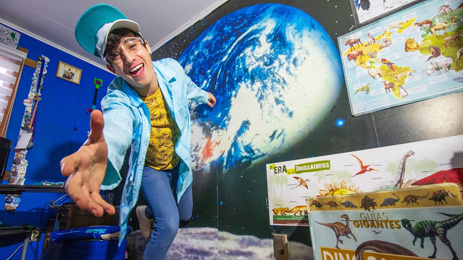
Science with a pink rabbit
How a crisis gave rise to innovative approaches to blended teaching and learning
Facundo Mercado Sandoval, 22, has become an established part of a team of university lecturers and scientists at the Universidad de Magallanes – by somewhat unconventional means. His fictional persona Facu and a pink rabbit called Jimmy are the lead characters in an online series of classes supported by the Experimento program. The series is aimed at preschool and elementary school children at public schools in Punta Arenas, a city near the southernmost tip of Chilean Patagonia, just north of the Antarctic. Their goal is to bring STEM education home to students in the region. Literally.
The setting
The city of Punta Arenas in Patagonia is located on the Strait of Magellan, a sea route that connects two oceans. It is one of the southernmost cities in Chile and on the entire continent. The city is also the gateway to the expansive, breathtaking landscapes in the surrounding region. Just a few miles outside the city expands a territory that has remained almost entirely unchanged for millennia, featuring glaciers, mountains, savannas and wild valleys. Intense winds create a challenging climate.
Before the Panama Canal was built, the area was home to one of the most strategically important ports in the Atlantic, on a key trade route to the Pacific. Patagonia has a fascinating history of settlers, sheep farmers and merchants. However, its past features dark chapters, including the decimation of the region’s natives. Locals are still working to come to terms with such events.
Today, Punta Arenas is primarily known as a hub for international tourism, the starting point for tours into the Torres del Paine or down into Antarctica. Patagonia is regarded as the world’s last pristine nature reserve. Put simply, it is a region we must protect.
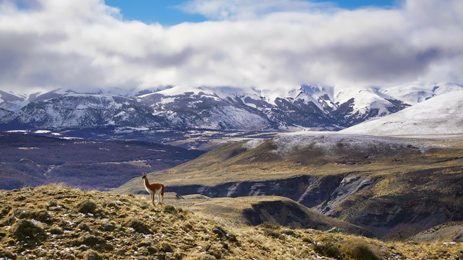
Before the Panama Canal was built, the area was home to one of the most strategically important ports in the Atlantic, on a key trade route to the Pacific. Patagonia has a fascinating history of settlers, sheep farmers and merchants. However, its past features dark chapters, including the decimation of the region’s natives. Locals are still working to come to terms with such events. Today, Punta Arenas is primarily known as a hub for international tourism, the starting point for tours into the Torres del Paine or down into Antarctica. Patagonia is regarded as the world’s last pristine nature reserve. Put simply, it is a region we must protect.
Territorio STEM Patagonia
The issues of increasing water pollution, air pollution and rubbish have only slowly begun to penetrate the local consciousness as people are encouraged to rethink their relationship with nature. This renders increasing the focus on STEM education in the region all the more urgent.
The local university, the Universidad de Magallanes, has a campus in Punta Arenas. Working with Siemens Stiftung, the university lent its support to an idea to intensify STEM education in local schools and, in the process, promote education on protecting the region’s natural resources. The result is the ‘Territorio STEM Patagonia’ project. Its first initiative, launched in 2020, involved a collaboration between teachers and students in the form of a series of workshops with the Experimento program, combined with content from the Chilean education ministry’s national ICEC STEM teaching program.
Experimento
Our international education program Experimento offers training in methodologies, teaching materials and specific experimental materials for all ages.
Just like in other countries around the world, schools and universities shut down overnight.
The STEM project was originally conceived as a series of in-person workshops. Yet, on March 19, 2020, the Chilean government sounded the alarm as the COVID-19 pandemic spread. In Chile, just like in other countries around the world, schools and universities shut down overnight.
The switch from analog teaching, with schools as spaces of communal learning, to sitting in front of a computer screen for hours every day suddenly became a reality for the university’s lecturers, teachers and students in the region.
STEM education in the midst of a pandemic
Leonardo Velásquez is a researcher and lecturer at the Universidad de Magallanes, along with his colleague Alan Maldonado. “The initial months of the pandemic were a mix of total lockdown, isolation, travel restrictions and extreme safety precautions,” they recall. “This meant we had to tear up plans for our Experimento project and start again. The result is something we never would have expected to be so successful.”
The result is something we never would have expected to be so successful.
With the help of the Internet, apps and media from various platforms – including the Siemens Stiftung Media Portal – the team developed an interactive series in which a character, Facu, hosts classes focused on STEM experiments. Together with students watching online, Facu puts scientific and practical knowledge to the test on topics such as energy, health and the environment.
The man behind Facu
Facundo Mercado Sandoval, 22, grew up in Punta Arenas. From an early age, he was intimately familiar with the endless plains, the precipitous mountain peaks, the valleys, glaciers and rivers, the lakes with their icebergs and caves, and the flora and fauna entirely different from anything further north on the continent. “I have always taken a keen interest in nature, says Mercado Sandoval. “As a child, I would observe nature very carefully, especially animals. I collected insects, plants, leaves – everything that took my interest.”
As a child, I would observe nature very carefully, especially animals.
“At that age, I wanted to study something related to dinosaurs and paleontology,” he remembers. Skeletons of various prehistoric animals have been discovered in the region. “In the end, I decided to study biology.” His parents guided his focus towards molecular biotechnology, an engineering degree, and he enrolled in a course at the Universidad de Chile at the age of 18.
He always had the feeling that he needed to do something more practical and closer to nature.
However, he always had the nagging feeling that he needed to do something more practical and closer to nature. After a year and a half, he decided to take a break from his studies. With his parents’ help, he found a job as an assistant at the Universidad de Magallanes, where he came across Alan Maldonado and his colleagues. Among other things, Maldonado’s team are responsible for the Chilean education ministry’s ICEC STEM teaching program. With the support and on behalf of Siemens Stiftung, they bring the Experimento program into schools.
In his second year, Facundo Mercado Sandoval joined the team at a foundation called EcoScience. He helped to promote natural sciences in mobile workshops held in different regions and encouraged children and young people to engage in experiments. “I became part of the team for the Experimento project and was even able to contribute my own ideas. Working alongside academics like Alan, Sergio, Maria Paz, Pablo, Leonardo and others was immensely motivating and a huge opportunity for me. After all, I had only just left school and only studied for a brief period!”
I became part of the team for the Experimento project and was able to contribute my own ideas.
COVID-19 forces rethinking education
Since the onset of the coronavirus pandemic in March 2020, everything has been focused on a single question: How can the team set up and deliver Experimento workshops if in-person events are out of the question? “The university team invited me to help develop ideas for a video series featuring experiments to teach young and older children about science, with content they could connect to the world surrounding them,” remembers Facundo Mercado Sandoval. The aim behind this format was to help children understand important knowledge and its practical applications.
Developing Facu, the fictional scientist
Facundo became Facu, a character he invented himself. “I spent a really long time thinking about what I should wear to give the kids an image of a scientist which might prove to them that we are not desperately boring people in white lab coats, hiding behind test tubes in tiled labs, cold and lacking empathy, and using super-academic words that nobody actually understands.”
Facundo became Facu, a character he invented himself.
I wanted to make clear that science is cool, fun and can almost be like a party.
Facu wears a blue lab coat and a colorful T-shirt, two baseball caps – one with the peak facing forwards, one with the peak to the back – safety goggles, and sunglasses with LED lights that flash when Facu wants to place special emphasis on something. “And a piercing, of course,” says Mercado Sandoval. “I wanted to make clear that science is cool, fun and can almost be like a party, but that what we learn and do is still important, serious stuff. And, of course, that we do everything in a safe way.” After a brief pause, he adds: “Plus, I wanted to show them that how you look really does not matter.”
Mercado Sandoval also gave thought to the language his character should use. Facu does not use colloquialisms or slang; instead, he makes sure to speak to the children clearly and sincerely. “I wanted to give them the feeling of engaging with Facu, sort of like researcher talking to researcher,” He worked all this out with the team of academics.
Jimmy, a pink rabbit, became a fixed part of the video series – as Facu’s assistant. “I have got a weakness for buying funny figurines online. When you squeeze Jimmy, he sticks out his tongue and makes a funny noise,” says Mercado Sandoval.
Facu does not use colloquialisms or slang. Instead, he makes sure to speak to the children clearly and sincerely.
Doing a lot with a little: Blended education workshops
“The project’s slogan is ‘Doing a lot with a little’,” explains Alan Maldonado from the Universidad de Magallanes. “This means low costs, efficient use of resources, and a creative approach to maximize the learning effect.” After contacting a local manufacturer, the team were able to put together material kits inspired by guidance from Experimento. The municipal authorities also provided support.
The material kits for the workshop series aimed at young, preschool age children were sterilized and individually packaged in line with the stringent safety precautions. The children presented their experiments at an online science exhibition before Facu the scientist presented the winners with awards – once again subject to strict safety and hygiene regulations.
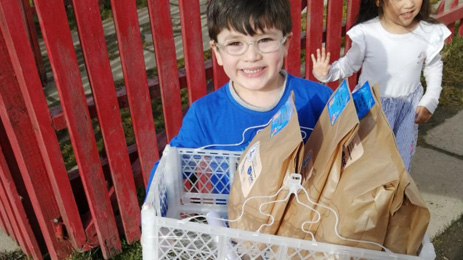
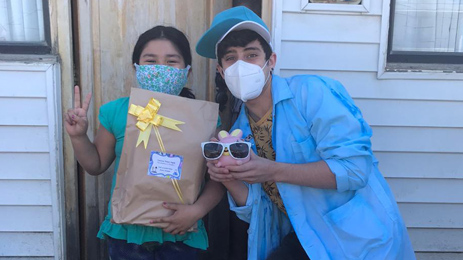
Even today, months later, Facundo Mercado Sandoval remembers how inspiring and emotional it was for him to ring children’s doorbells and give the students their awards, albeit wearing a mask and gloves and while maintaining a safe distance. “The children were so delighted and excited. They were eagerly looking forward to our next virtual meet-up.”
Each experiment set also contained small surprises for the children in the hope of turning the educational series into an exciting collaboration, including small prizes and new tasks to complete as weekly projects. Every week, Facu and his pink rabbit hosted workshops for the students and their families. Facu conducted experiments with them and chatted with them over Zoom well beyond the scheduled hour.
The children were so delighted and excited. They were eagerly looking forward to our next virtual meet-up.
We are online, so everyone can see what we are doing!
At the same time, an IT team worked with lecturers and education specialists to create an open-access platform, a dedicated website where students taking part in the workshops could upload their own videos, photos and presentations on different units with their parents’ help – as evidence of the hours they had spent engaging with STEM. The students’ response was hugely enthusiastic. “We are online, so everyone can see what we are doing!”
Virtual collaboration for blended learning
Each week, the team members from the Universidad de Magallanes met virtually to develop content for the next workshop and establish the pedagogical and didactic underpinnings. This involved writing the script and then recording. A strict lockdown was still in force at the time, so Facundo Mercado Sandoval recorded videos using two mobile phones and edited them on a laptop. He mounted one phone over the work surface to film the experiments and used the other phone to film himself.
The academic team at the university beavered away in the background, switching back and forth between the cameras, playing videos, showing images, displaying presentations, and coordinating questions and answers via the chat function. “A highly unusual teaching methodology,” comments Leonardo Velásquez, the department head.
A strict lockdown was still in force at the time, so Facundo Mercado Sandoval recorded videos using two mobile phones.
Experimento | 4+ and | 8+ showed their value, stimulating the development of solutions based on ideas and materials proposed by the program and contributed by the students themselves. The best projects were awarded small prizes – always STEM-focused, of course – to keep the children excited about experimenting.
The experiments
Facundo Mercado Sandoval has particularly strong memories of the experiment on electrical circuits. He gave the elementary school students the task of building a ship capable of moving independently using a power source. Facu asked the children to record their inventions and solutions on their mobile phones. The team received videos of ships of all shapes and sizes in bathtubs, basins and sinks.
For another task, “put a toy in an unusual situation”, Facundo Mercado Sandoval designed a tinfoil hat featuring an LED for Jimmy, the pink rabbit. When a cable was connected to the hat, the diode lit up. This gave the children inspiration to fashion light-up glasses and even light-up boats.
The team received videos of ships of all shapes and sizes in bathtubs, basins and sinks.
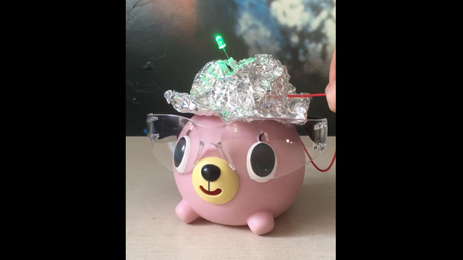
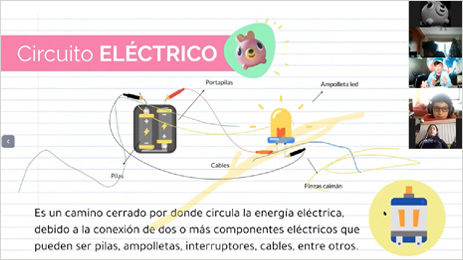
When it came to the topic of health, the team used experiments to show why cleaning your teeth is so important and the role acids and bacteria play in protecting your teeth. The experiment used an egg to demonstrate this. Facundo Mercado Sandoval also showed it to his seven-year-old sister Violeta. “Since then, we have not had to persuade her to clean her teeth every day – she got the message!”
Beyond Patagonia
The series with Facu and Jimmy became a tremendous success. In total, 20 schools, 90 students and their supportive parents took part in the workshop series for preschoolers. In fact, there was far greater interest than the team and the available resources could handle. Plans are in place to expand the program as soon as it is financially feasible.
The Universidad de Magallanes systematically recorded students’ work with the project, following their development and learning achievements as a scientific project in its own right. The pandemic also brought about changes to teaching, with children attending classes remotely from their own homes. These new learning environments resulted in parents and family members supporting and observing learning processes more closely.
The Universidad de Magallanes is following the students development and learning achievements as a scientific project in its own right.
The older students in secondary education received classes on programming and worked with Arduino, an open-source electronic prototyping platform that makes it possible to create interactive electronic objects. This is another creative solution developed by the Universidad de Magallanes in collaboration with and on behalf of the Chilean education ministry’s ICEC program as a logical evolution of the Experimento series.
If the pandemic had not happened, we never would have thought of integrating parents as co-teachers.
In time, the Facu and Jimmy workshop series caught the education ministry’s interest. At present, the ministry is considering how a national series could be established based on the Punta Arenas model in partnership with the team at the Universidad de Magallanes.
“If the pandemic had not happened, we never would have thought of integrating parents as co-teachers,” say Leonardo Velásquez and his colleague Alan Maldonado. “We would never have thought of Facu and his companion Jimmy the rabbit; we would never have developed a safe logistics program to bring school and educational materials home to children.”
Both are grateful to Siemens Stiftung for the flexibility and scope to develop innovative approaches for remote schooling. “We have put our heart and soul into this project and we are delighted by how it has developed. We are thrilled by the collaboration with children and parents, too. We have learned how we can structure education, using new media that were previously underused.”
We have learned how we can structure education.
The project also helped Facundo Mercado Sandoval to discover what he really wanted to study. He has now enrolled on a course in film studies at the Universidad de Chile. “I can say that, since I started studying film, I have been happy. It fascinates me. I even really enjoy mandatory subjects that other students find boring, like journalism. I have great professors who pass on their knowledge with passion.” He pauses and adds: “I am in just the right place, because I know that I can do exactly what I always wanted: help others to understand my fascination with nature, create stories, and tell people these stories through film.”
October 2021


